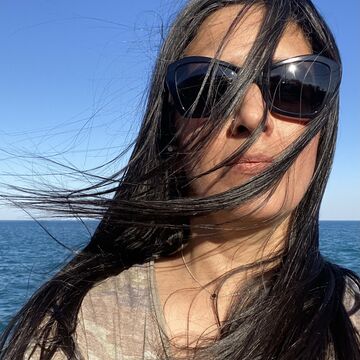

Gitanjali Kapila
Associate Professor, Adjunct
Contact
Bio
Education: BA, 1989, Wesleyan University; MFA, 1999, Columbia University. Television Broadcasts: 'Hjælp, Vi har fået børn!': DR1, Denmark. Screenings: 'Løsrivelse': Seattle International Film Festival; Female Eye Film Festival, California; Chicks with Flicks Film Festival, New York; Curtas Vila do Condo, Brazil; Arizona International Film Festival; Boston International Film Festival. Awards: Nominated Best Film, Female Eye Film Festival; Winner Best Film, Chicks with Flicks Film Festival; Breathing above the Treeline: 32 Official Selections (14 live screenings world-wide); 4 Winner, Best Narrative Short; 1, Nomination Best Female Director; 1 Nomination, Best Writing; Selectee, Danish Film Institute Production Grant; Selectee, International Financing Forum, Toronto International Film Festival; Part-time faculty grant, Columbia College Chicago; Faculty Enrichment Grant, SAIC.
Other: Presented on Soderbergh's narrative app Mosaic at the CILECT Congress 2018 Mumbai, India and writing for inter-active narrative at the CILECT Congress 2019 Moscow; Published article on gender and narrative in George Miller's "Mad Max Fury Road" in a volume published by Columbia College Chicago and University of Palermo, Buenos Aires, May 2019; Presented on my gender and narrative article in Buenos Aires at the 4th International Colloquium of Researchers in Design in July 2019; Presented a paper on writing for interactive internet-based media at CILECT 2019 in Moscow, October 2019; Published my second article on race and narrative in Jordan Peele's "US," May 2020; Presented on race and narrative virtually at the 5th International Colloquium of Researchers in Design in July 2020; Published my third article on class and narrative in Bong Joon- Ho's "Parasite," May 2021; Presented on class and narrative article virtually at the 6th International Colloquium of Researchers in Design in July 2021. Published my fourth article on coronavirus, Oedipus Rex and Stephen Spielberg’s “Jaws.” in May 2022; recently completed two narrative shorts, "Bat" and "Groped;" currently in development on a family sitcom "Meet the Singhilas #brampton"Currently in development on a family-sitcom “Meet the Singhilas.”